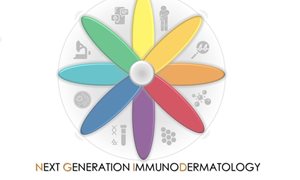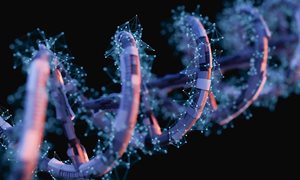
Camille le Gall and colleagues from theme Nanomedicine published in the Journal of Immunotheraphy of Cancer that the efficient targeting of NY-ESO-1 tumor antigen to human cDC1s by lymphotactin results in cross-presentation and antigen-specific T cell expansion.
Conventional dendritic cells type 1 (cDC1s) excel at antigen cross-presentation, optimal for eliciting specific cytotoxic immune responses. This characteristic makes cDC1s ideal target cells for targeted vaccine cargo delivery. However, cDC1s are the rarest subset of dendritic cells (DCs), representing only 0.03% of human peripheral blood mononuclear cells (PBMCs), making them difficult to study. At the department of tumor immunology we have the expertise to isolate cDC1s in sufficient numbers via donor apheresis.
The cDC1s uniquely express X-C motif chemokine receptor 1 (XCR1), which binds and internalizes the chemokine XCL1. We made a site-specifically modifiable human XCL1 derivative for the modular conjugation of tumor antigens, such as the tumor-associated antigen NY-ESO-1 (157-165). Unfortunately, these peptide epitopes are notoriously poorly soluble, complicating the generation of peptide-based vaccines, often resulting in insoluble products. We solved this problem by linking a 5 kDa polyethylene glycol (PEG5k) to the peptide before conjugation to XCL1. Surprisingly, this PEGylation of the XCL1 - NY-ESO-1 peptide conjugate does not interfere with XCR1 binding on primary human cDC1s. This binding results in antigen uptake, antigen cross-presentation and subsequent activation of NY-ESO-1-specific T cell. We thus present a versatile modular platform to generate human cDC1-targeted vaccines applicable to a variety of typically poorly soluble tumor antigens.
Related news items

Rubicon grants awarded to three RIMLS researchers
19 April 2022Three researchers have received Rubicon funding from NWO/ZonMw. This will enable Elke Muntjewerff, Laura de Vries and Laurens van de Wiel to do research at a foreign research institute for the next two years.
go to page
Large NWA ORC grant awarded for national skin research: Next Generation ImmunoDermatology
23 March 2022Research for better treatment methods for chronic skin diseases.
go to page
ERC Proof of Concept Grant for Martijn Verdoes
8 March 2022 Martijn Verdoes, group leader Chemical Immunology at the department of Tumor Immunology, has been awarded an ERC Proof of Concept (PoC) Grant. The ERC PoC Grants are designed to support ERC grantees with the commercial or societal application of the results of their funded research. go to page
NWO OTP grant to investigate fibrotic diseases with organ-on-a-chip technology
22 December 2021 Wouter Verdurmen & Peter van der Kraan have been awarded with a grant by the Netherlands Organisation for Scientific Research (NWO-OTP) to develop and employ innovative organ-on-a-chip models to investigate fibrotic diseases, with a particular focus on systemic sclerosis. go to page
New genetic defect links cell biology and protein glycosylation
10 November 2021 Peter Linders, Dirk Lefeber and Geert van den Bogaart together with international colleagues have recently reported on novel cell biological insights, by identifying a genetic disorder in syntaxin-5 which allowed to unravel a new mechanism regulating intracellular transportation. go to page